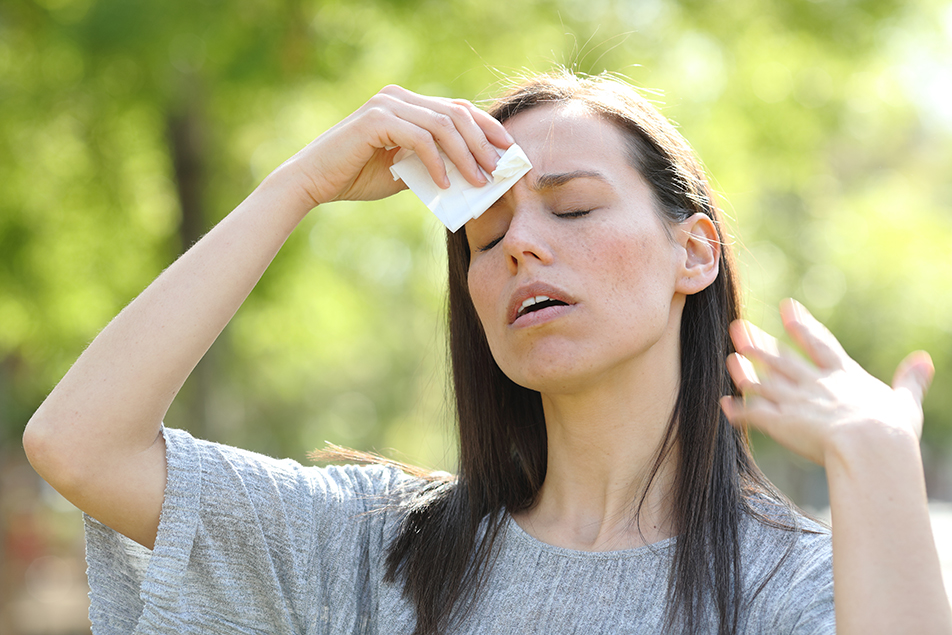
With the heat index and humidity on the rise, daily activities can be especially dangerous. We asked John Falatko, DO, PPG – Internal Medicine to discuss the risks of heat-related illnesses and the precautions that everyone should take during these hot summer months.
What might put someone at a higher risk for heat-related illnesses?
The biggest risk anyone is going to deal with regarding heat-related illnesses or death is isolation. This is especially true if someone lives alone or doesn’t have anyone checking on them. In these cases, the individual may not be able to get help if needed or recognize the signs and symptoms before someone else would if they’re already feeling confused and lethargic. In addition to isolation, other high-risk factors could include:
- Underlying health conditions: Cardiovascular conditions such as heart disease (or heart failure) and high blood pressure are going to play a major role. This is mainly due to the medications these patients take. Many are on diuretics which will compound dehydration during episodes of heat. Then, if they were to experience heart failure they wouldn’t have much on reserve to combat dehydration making it harder for their heart to function.
- Diabetes: Another underlying condition patients will struggle with during high temps is diabetes, especially poorly controlled diabetes. For example, if someone’s blood sugar typically runs high their blood sugar is going to act as a diuretic, causing them to lose water very easily and becoming dehydrated very quickly.
- Kidney disease: Patients who suffer from kidney disease are also going to have difficulty. They are at risk of their disease worsening or developing a kidney injury they become dehydrated or overheated.
- Medication: Some patients could be on medications that make it difficult for them to regulate heat. These are medicines that we typically use for urinary or incontinence issues. They can have side effects that can cause temperature regulation to be off. Some blood pressure medications also affect temperature regulation. The signs and symptoms that someone might be overheating could be dulled by these medicines.
Why is the elderly population at a higher risk for heat-related illnesses?
As our bodies age, we naturally become frailer and some medications can compound this effect. However, these same medications are needed to stay healthy and in normal conditions, they do just that, but in extreme conditions, they can be detrimental if not monitored closely. Also, some patients are on medications for long periods, continuing to take them habitually, but they may not need them. That’s why it’s always a good idea to go through your medication list with your doctor at least once a year to see if you need that medication. This can help prevent unnecessary medication errors and adverse reactions.
How dangerous can it be for someone living and sleeping in a house without air conditioning?
As you age your detection systems may not be as sharp as they once were when experiencing a problem. For example, in the evening your natural sweating decreases, so you don’t naturally cool your body as well at night. Because of this, it could be more difficult for you to wake up during a sleep cycle in hot conditions. The medications you’re taking also play a big role. Many elderly patients take medicine for sleep, anxiety and depression but some of these can make it difficult for someone to wake up or be aware if there’s a problem. So, with a blunted detection system, low sweat and altered response time sleeping without air conditioning could dangerous because as the temperature rises in your home and so does your body temperature causing you to get overheated.
How long does it take to acclimate to new weather conditions or environment?
I’m not exactly sure how long acclamation takes, but some studies have stated that it does take quite some time for people to adjust to a new climate. The study compared people living in southern states to those living in northern states. It showed those living in northern states did have more difficulty acclimating to warmer temperatures and could take several months or even a couple years to adjust to the abrupt changes in temperature.
Extra precautions to take this summer
- Life Alert System: One thing you could do if you’re concerned about someone who may be at risk is to investigate a life alert system, especially if someone is isolated. These are very beneficial to people who are living alone. Often, if someone is getting sick, they’re not going to have the energy or the wherewithal to call an ambulance or take themselves to a hospital or even get to a phone. But, if they have the life alert system, they can just hit the button.
- Medication review: Always a good idea to do a medication review with your doctor, especially in the winter and summer months. During your annual physical make sure all the medicines you’re on are appropriate and still need to be taken because your body is going to change over time, and you may not need them anymore.
- Keep it cool: Even if you have only one room in your home that’s air-conditioned that can provide a significant amount of relief for somebody, helping to prevent any heat-related illnesses or accidents. Even a simple box fan can go a long way to keeping a room cool.
- Check-in: If you can, check-in at least once a day with your friend or loved one to make sure they’re okay and that you can get a hold of them.
For more information and tips to beat the heat this summer, please visit the Centers for Disease Control and Prevention website.



